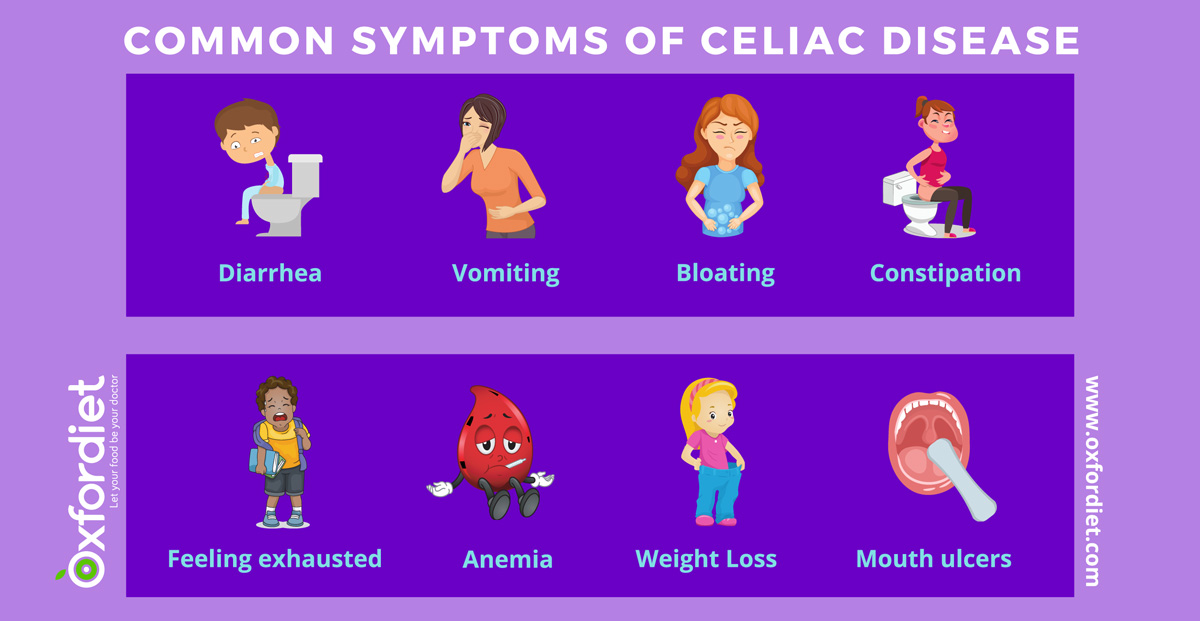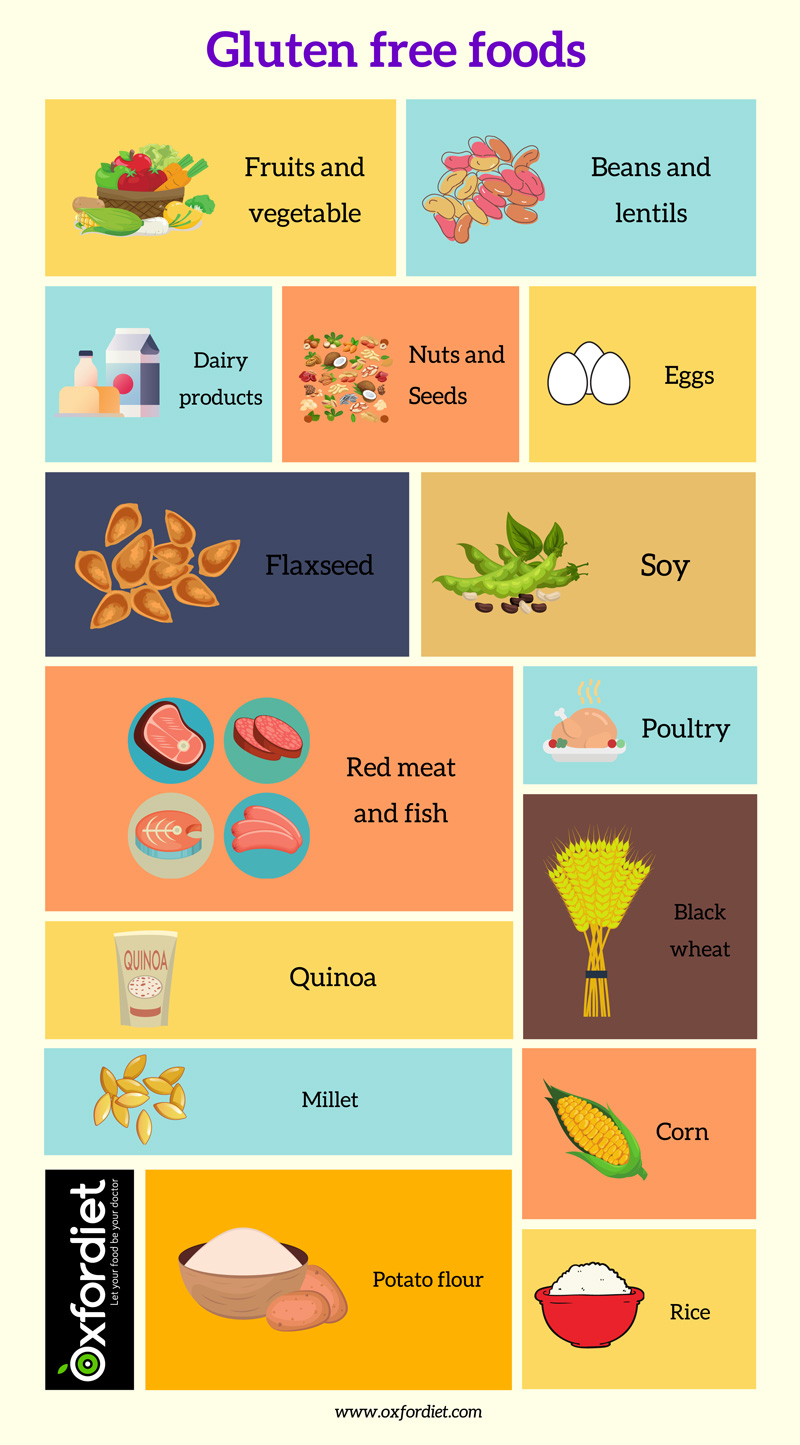Celiac Disease Diet
Celiac disease is an autoimmune disease in which the lining of the small intestine is damaged. Gluten - a type of protein found in some cereals such as wheat, barley, and rye - stimulates the body's immune cells, resulting in immune cells attacking gluten for Destroying; it also damages the surrounding tissues, including the small intestine.
There is currently no cure for celiac disease. One must limit the dietary intake and eliminate gluten from the celiac disease diet. Even minimal amounts of gluten can have a detrimental effect on intestinal tissue, even if you do not see apparent signs, but it can have side effects.
Celiac disease diet is a relatively hard diet. Still, we are here to help you change your diet and get rid of celiac disease problems.
Celiac disease is an inherited, non-contagious disease, So you do not need to worry if someone around you has celiac disease.
Celiac disease will have fewer side effects if diagnosed and treated as soon as possible.
Common symptoms of celiac disease
Symptoms of celiac disease may vary from person to person, but the most common symptoms that a celiac patient experiences when consuming gluten in their diet include:
♦ Diarrhea
♦ Vomiting
♦ Bloating and gastritis
♦ Constipation
♦ Feeling exhausted
♦ Anemia
♦ Weight Loss
♦ Mouth ulcers
Suppose a patient with celiac disease does not use a celiac diet and does not control his disease. It can cause more severe problems for the patient, such as being away from communities and depression, infertility, lack of nutrients in the body, etc.

How does a celiac diet help control the symptoms of the disease?
Currently, the best treatment for celiac is to have a healthy diet for celiac disease. Since no definitive cure for celiac disease has yet been found, the best way to control it is to use a gluten-free diet.
How long you recover from eliminating gluten from your diet varies from person to person; some people are recovering immediately after eliminating gluten. In contrast, others may be sick for weeks. Your recovery time depends on the repair time of your small intestinal tissues.
If you still have symptoms of celiac disease after using a gluten-free diet, You should see your doctor for further examination about other gastrointestinal diseases such as IBS or lactose intolerance.
Therefore, by eliminating gluten from your diet, you can prevent the immune system from attacking gluten in the intestines. As a result, the small intestine is not damaged.
Foods You Should Avoid In Your Celiac Diet
To control the side effects of celiac disease, you should avoid gluten-containing foods in your diet. Below is a list of gluten-containing food that you should avoid in celiac disease diet:
♦ wheat and all foods made from wheat and wheat flour.
♦ barley
♦ triticale
♦ malt and its compounds
♦ brewer's yeast
Of course, you should be aware that these compounds may be used in many other foods, so you should avoid foods that use the above foods in their contents. The following is a list of foods that are prepared with the above ingredients.
♦ Beer
♦ wheat bread
♦ Pasta
♦ Cookies, biscuits, cakes
♦ breakfast cereal
♦ Sausages and hot dogs
♦ Some sauces like ketchup
♦ Chocolate milk
When buying food, be sure to read the label on its contents and note that it must be gluten-free.
You should also be careful about the hidden source of gluten in some cosmetics such as toothpaste, lipstick, some medications and supplements, etc.
How should people with celiac disease get food from a restaurant?
Even small amounts of gluten in the diet can trigger the symptoms of celiac disease. So these patients should be cautious about their food intake.
If you want to buy gluten-free foods from restaurants, be sure to tell them to fry or cook your food in separate oil; cooking with other foods can combine gluten with your food and make your celiac symptoms worse.
Also, when you are buying food from a restaurant, the food ingredients are very important. Be sure to tell them about your condition and that you follow a celiac disease diet, and do not include gluten-containing foods in your diet.
In addition, Some restaurants cook food for celiac patients; you can enjoy your food from these restaurants without worry.
Can medications contain gluten worsen the symptoms of the celiac?
Gluten is a major ingredient in the pharmaceutical industry that causes drug compounds to stick together. Therefore, many medications may contain gluten.
So people with celiac disease may also have problems with taking medications and supplements.
Because the ingredients of some medications are not known and do not have a gluten-free label, if you are experiencing celiac disease symptoms while taking certain medications, call your doctor and ask if you are taking or not taking the medication.
How to prevent nutrient deficiencies in celiac disease?
One of the most common complications of celiac disease is a lack of nutrients. The severity of the disease and how much of the intestine is affected by the disease affects the absorption of nutrients.
People with celiac disease are often deficient in specific vitamins and minerals. Vitamin B12, iron, vitamin D and calcium deficiencies are among the most common nutritional deficiencies in celiac patients. Zinc and folic acid deficiency are also seen in some patients.
One of the symptoms of celiac disease is mild iron deficiency. Iron malabsorption in celiac patients leads to iron deficiency anemia in these people.
In severe cases of celiac disease, the patient may also have difficulty absorbing macronutrients. One of the digestive problems in severe celiac disease cases is fat malabsorption, which causes fatty diarrhea. In these cases, the person loses weight due to reduced calorie intake and subsequently becomes malnourished.
The first and best way to control celiac disease is to follow a gluten-free diet. To get a celiac disease diet, be sure to consult with a dietitian to adjust the best diet to prevent nutrient deficiencies in you.
Foods you can eat in the celiac disease diet
Since many foods contain gluten, you may be wondering what foods you can eat in a celiac disease diet?
You can use the below foods in your daily diet without worrying about gluten.
♦ Fruits and vegetable
♦ Beans and lentils
♦ Dairy products (read the label on it so that no gluten is added to it)
♦ Nuts and seeds
♦ Eggs
♦ Red meat and fish
♦ Poultry
♦ black wheat
♦ Corn
♦ Rice
♦ Millet
♦ Potato flour
♦ Quinoa
♦ Flaxseed
♦ Soy

Foods You Should Eat To Prevent Nutrient Deficiency In Your Celiac Diet
To help prevent nutrient deficiencies, dietitians recommend using rich sources of micronutrients in the celiac diet.
Here are the sources of vitamins and minerals that are usually deficient in celiac patients:
♦ Iron: Red meat (do not use processed red meats such as sausages or hot dogs), spinach, white beans, lentils, tofu, peas and cashews
♦ Vitamin D: Juices and dairy products fortified with vitamin D, Sardines, salmon and eggs.
♦ Calcium: Dairy, salmon, sardines, cabbage, tofu, calcium-fortified orange juice and figs.
♦ B vitamins: Sunflower seeds, beans, lentils, spinach, mushrooms, chicken, broccoli and asparagus.
♦ Zink: Red meat, poultry and cashews.
13 important tips you should know about the celiac diet
♦ Celiac disease treatment uses a gluten-free diet, and currently, there is no medication to treat this disease.
♦ Medication in a celiac patient is prescribed only for patients with severe conditions to reduce the disease's symptoms, and it is a temporary treatment.
♦ The recovery period for celiac with a gluten-free diet can last from a few weeks to several months.
♦ If celiac left untreated, it could lead to severe illnesses such as bowel cancer.
♦ Instead of wheat flour, use rice flour, corn flour and potato flour to cook different foods.
♦ There is nothing wrong with eating beans in celiac patients' diets, and you can consume them.
♦ Use dairy products, especially prebiotic dairy products, in your celiac diet, but make sure they do not contain additives.
♦ If a patient with celiac disease has diarrhea, stop consuming milk in the diet and use alternatives.
♦ Fruits and vegetables are free to use, and you can use them in sufficient quantities according to a nutritionist's advice.
♦ Omega-3 fatty acids can reduce inflammation and improve the symptoms of celiac disease. You can use omega-3 sources such as olives, avocados, walnuts and fatty fish in your diet.
♦ Note that some drugs also contain gluten in their composition, so you can not take any drug without your doctor's consultation.
♦ Due to the disease, you may suffer from some nutrient deficiencies in your body and need to take supplements such as vitamin D, calcium, folic acid, iron, etc. Talk to your dietitian about whether or not to take these supplements.
♦ Do not forget that the best treatment for celiac disease is a gluten-free diet.
Comments
Post a Comment